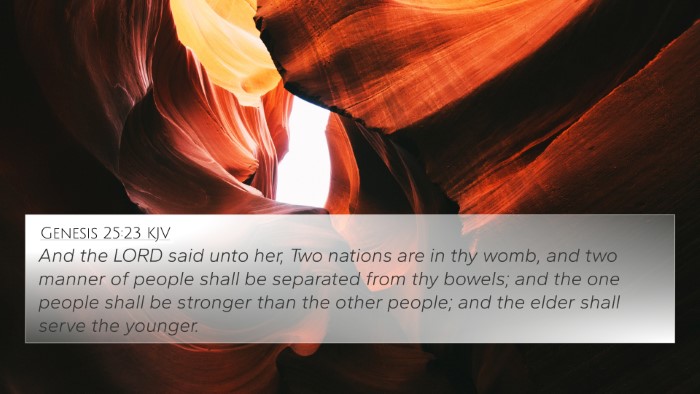Understanding 1 Samuel 17:14
1 Samuel 17:14 states, "And David was the youngest: and the three eldest followed Saul." This verse plays a crucial role in the narrative of David's rise to prominence in Israel, especially in the context of his battle with Goliath. Below, we combine insights from various public domain commentaries to illuminate its meaning.
Summary of Commentary Insights
This verse highlights David's position among his brothers and sets the stage for his later anointing as king. Here, we can extract several key themes:
-
David's Role as the Youngest:
Matthew Henry emphasizes that David, being the youngest, holds a place of humility in the family. This fact illustrates that God often chooses the lowly and humble for His significant purposes.
-
Contrast with His Brothers:
Albert Barnes notes that the three eldest brothers are depicted as soldiers following King Saul. This contrast sets the stage for David's unique calling and destiny, as he stands apart from conventional expectations.
-
Theological Implications:
Adam Clarke speaks to the theological significance of youth in God's plan, suggesting that God's choices often confound human wisdom. David’s youth becomes a point of discussion concerning God's power to use the underestimated for His divine mission.
Cross-References for Deeper Analysis
To fully comprehend the implications of 1 Samuel 17:14, we can identify several Bible verse cross-references:
- 1 Samuel 16:7: "But the LORD said unto Samuel, Look not on his countenance, or on the height of his stature; because I have refused him: for the LORD seeth not as man seeth; for man looketh on the outward appearance, but the LORD looketh on the heart." This verse highlights God's perspective on choosing leaders.
- Hebrews 11:32-34: These verses recount the faith of various biblical figures, including David, illustrating the faithfulness in seemingly small beginnings that lead to great outcomes.
- Psalm 78:70-72: "He chose David also his servant, and took him from the sheepfolds: From following the ewes great with young he brought him to feed Jacob his people." This verse parallels David’s humble beginnings with his future leadership role.
- 1 Samuel 16:11: "And Samuel said unto Jesse, Are here all thy children? And he said, There remaineth yet the youngest, and, behold, he keepeth the sheep." This illustrates the lowly status of David at the time of his anointing.
- Matthew 11:25: “At that time Jesus answered and said, I thank thee, O Father, Lord of heaven and earth, because thou hast hid these things from the wise and prudent, and hast revealed them unto babes.” This aggravates the theme of God using the humble and weak.
- 1 Corinthians 1:27: "But God hath chosen the foolish things of the world to confound the wise; and God hath chosen the weak things of the world to confound the things which are mighty." This connection elaborates God's choice of David backed by his humble stature and youth.
- Romans 8:28: “And we know that all things work together for good to them that love God, to them who are the called according to his purpose.” This verse underscores the sovereign working of God in the lives of His chosen, such as David.
- 1 Samuel 17:33: "And Saul said to David, Thou art not able to go against this Philistine to fight with him: for thou art but a youth, and he a man of war from his youth." This highlights the challenge David faces, reiterating his youth in contrast to his opponent.
- Philippians 3:7-8: The Apostle Paul, reflecting back on his own life, mirrors a similar theme of valuing God's calling over worldly status.
Thematic Connections and Interpretations
Throughout the Bible, there are clear connections between themes of youth, humility, and divine selection.
- Humility and Divine Selection: The consistent biblical theme that God opposes the proud and favors the humble is prevalent in both the Old and New Testaments. David’s youth displays this notion that age and societal status do not determine worthiness in God's eyes.
- The Role of Leaders: David's life exemplifies the shift from human expectation to divine purpose. The evaluation of leaders based on their hearts rather than their outward appearance is a recurrent theme across Biblical texts.
- Courage in Weakness: David's story reinforces the idea that God empowers the weak to face great challenges, as illustrated in his confrontation with Goliath, which follows shortly after this verse.
Conclusion
1 Samuel 17:14 encapsulates a pivotal moment that serves as a precursor to the monumental events in David's life. By cross-referencing this verse with others, we gain a richer understanding of God's preferences and plans. Studying these connections not only enhances our comprehension of individual scriptures but also reveals the intricate tapestry woven throughout the Bible.
This exercise in scriptural cross-referencing exemplifies the importance of understanding the broader context of Biblical narratives and the relationships between Biblical texts. By employing tools for Bible cross-referencing, we can deepen our study and foster a greater appreciation for how verses relate and build upon one another.




